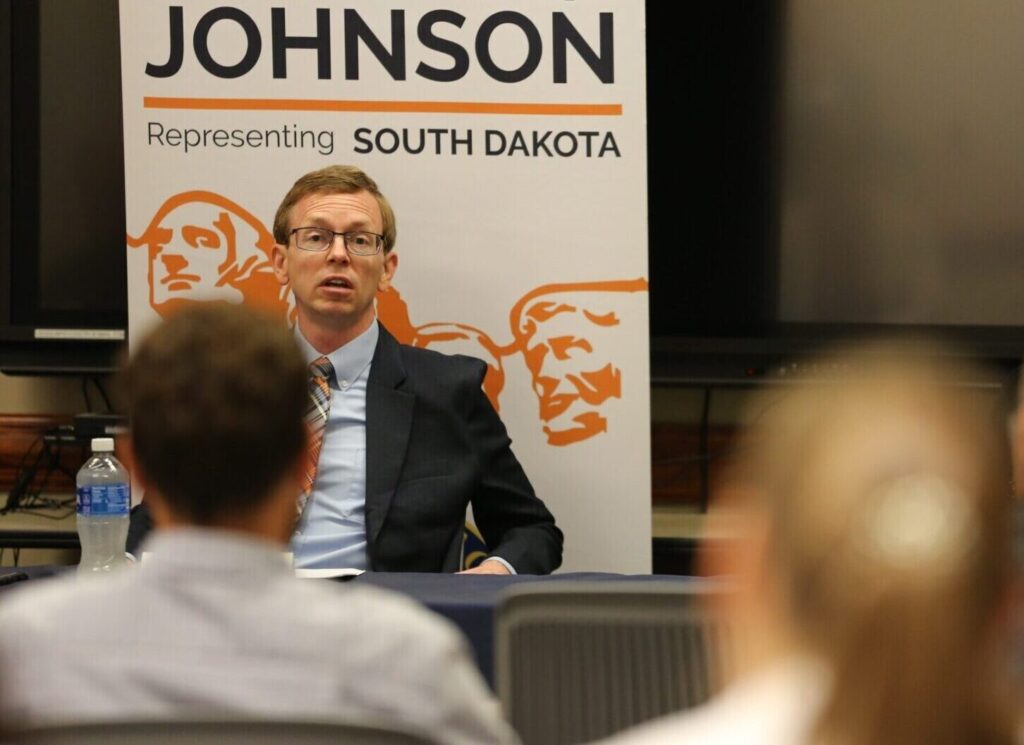
U.S. Rep. Dusty Johnson, R-South Dakota, fields questions during a roundtable discussion at Avera Behavioral Health Hospital in Sioux Falls on July 29, 2025. (Joshua Haiar/South Dakota Searchlight)
SIOUX FALLS — South Dakota health professionals and advocates are warning that new Medicaid work requirements could disrupt care for people struggling with substance use disorders and other behavioral health problems.
Angela Kennecke, CEO of the addiction-focused nonprofit Emily’s Hope, said people with a history of addiction often have criminal records. She said that means they face steep obstacles in the job market.
“If you can’t get a job, you lose coverage,” she said. “But without coverage, you can’t get treatment. That’s the cycle we’re concerned about.”
Kennecke spoke to South Dakota Searchlight after a roundtable discussion organized by U.S. Rep. Dusty Johnson, R-South Dakota, on Tuesday at Avera Behavioral Health Hospital.
SD providers hope over $500 million for rural health care offsets expected Medicaid coverage losses
Wyatt Urlacher, a clinical social worker with South Dakota Urban Indian Health, told the roundtable he’s worried, and “I’m sure I’m not the only one.”
“The majority of my clients are covered by Medicaid,” he said.
Kim Malsam-Rysdon, Avera’s vice president of public policy and a former South Dakota secretary of health, talked with South Dakota Searchlight after the discussion.
“We know that people who have access to health insurance, whether that’s Medicaid or anything else, are more likely to get the care they need earlier,” Malsam-Rysdon said. “So it’s a big concern for us when folks may lose their health care coverage for whatever reason.”
Medicaid is a federal-state program that pays for the health care of low-income people. Under the new federal policy in the Big Beautiful Bill Act, Medicaid recipients will be required to log 80 hours a month of work, job training, education or volunteering to keep their benefits.
Johnson defended the new Medicaid requirements, highlighting the list of exemptions.
“What people don’t understand is that seniors, young people, pregnant women, people with children, folks with disabilities, people in areas with high unemployment, veterans and tribal members are unaffected by the work requirement,” Johnson said.
Federal fallout
As federal funding and systems dwindle, states are left to decide how and whether to make up the difference.
A March 3 analysis in the journal Health Affairs estimated that 2.29 million Medicaid enrollees with a substance use disorder in the U.S. would still be at high risk of losing coverage under a work requirement that includes exemptions for people with disabilities, those looking for work, or in school or training. That is largely due to the number of people with a substance use disorder who are unable to meet a work requirement.
Taylor Clark, the operations supervisor at Choices Recovery Services in Sioux Falls, told South Dakota Searchlight that 95% of the people who seek care there are Medicaid recipients, and few of those people are employed. Clark said that without Medicaid for those seeking care, services may be in jeopardy.
A $50 billion fund created by the bill to help rural providers deal with lost Medicaid reimbursements is expected to bring at least $500 million to South Dakota over five years. But Johnson said the money is temporary rather than permanent.
“This is not a forever pot of money,” Johnson told Searchlight. “States should not use this to just fund ongoing operations. They need to ask themselves, ‘How do we use this money to transition to a better system?’”
Johnson said providers should invest in technologies to help deliver greater access to cost-effective health care.
The Medicaid work requirement will take effect nationally at the end of 2026.
As federal policy changes affect South Dakota, stay in the know: Sign up for our free newsletter.


